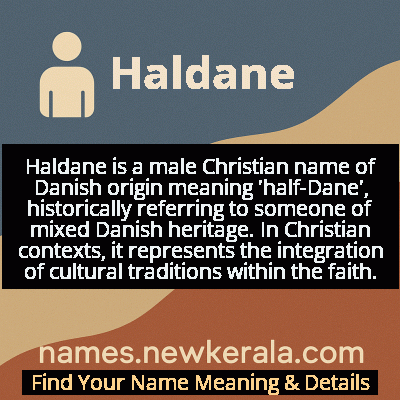Haldane Name Meaning & Details
Origin, Popularity, Numerology Analysis & Name Meaning of Haldane
Discover the origin, meaning, and cultural significance of the name HALDANE. Delve into its historical roots and explore the lasting impact it has had on communities and traditions.
Name
Haldane
Gender
Male
Origin
Christian
Lucky Number
9
Meaning of the Name - Haldane
Haldane is a male Christian name of Danish origin meaning 'half-Dane', historically referring to someone of mixed Danish heritage. In Christian contexts, it represents the integration of cultural traditions within the faith.
Haldane - Complete Numerology Analysis
Your Numerology Number
Based on Pythagorean Numerology System
Ruling Planet
Mars
Positive Nature
Generous, passionate, energetic, and humanitarian.
Negative Traits
Impulsive, impatient, moody, and can be overly emotional.
Lucky Colours
Red, maroon, scarlet.
Lucky Days
Tuesday.
Lucky Stones
Red coral, garnet.
Harmony Numbers
1, 2, 3, 6.
Best Suited Professions
Military, sports, philanthropy, leadership roles.
What People Like About You
Courage, energy, leadership, generosity.
Famous People Named Haldane
J.B.S. Haldane
Geneticist and Evolutionary Biologist
Pioneered population genetics and evolutionary biology, formulated Haldane's principle in evolutionary biology
John Haldane
Philosopher
Renowned Scottish philosopher specializing in metaphysics and philosophy of religion
Richard Haldane, 1st Viscount Haldane
Statesman and Lawyer
British Liberal and later Labour politician, Secretary of State for War, Lord Chancellor
James Haldane
Evangelist and Minister
Scottish evangelical preacher and co-founder of the Congregationalist movement in Scotland
Name Variations & International Equivalents
Click on blue names to explore their detailed meanings. Gray names with will be available soon.
Cultural & Historical Significance
The name's journey from Viking origins to Christian acceptance illustrates the complex cultural exchanges that shaped medieval Europe, where pagan names were often preserved within Christian contexts, symbolizing the integration of different cultural traditions. In Scotland, the Haldane name became associated with the educated elite and professional classes, particularly during the Scottish Enlightenment and subsequent centuries. The name's persistence through religious and cultural transformations demonstrates its adaptability and enduring appeal across different historical periods and social contexts.
Extended Personality Analysis
Individuals named Haldane are often perceived as possessing strong analytical minds and intellectual curiosity, traits embodied by famous bearers like J.B.S. Haldane. They tend to be methodical thinkers with a natural inclination toward science, philosophy, or strategic planning. Their personality often combines Scandinavian resilience with Christian moral grounding, creating individuals who are both practical and principled. Haldanes typically demonstrate leadership qualities tempered with humility, showing determination in pursuing their goals while maintaining ethical standards.
In social contexts, people with this name often exhibit a blend of traditional values and progressive thinking, making them effective in roles requiring both stability and innovation. Their communication style tends to be direct yet thoughtful, and they often inspire trust through their consistent character and reliable nature. The historical weight of the name seems to instill a sense of responsibility and connection to heritage, while its intellectual associations encourage lifelong learning and curiosity. These individuals often excel in fields requiring both analytical rigor and ethical consideration, balancing logical thinking with compassionate understanding.
Modern Usage & Popularity
In contemporary times, Haldane remains a relatively uncommon but respected name, primarily used in Scotland and among people of Scottish descent worldwide. It maintains a classic, distinguished quality that appeals to parents seeking traditional names with historical depth. While not ranking in most popular name lists, it enjoys steady usage particularly in academic and professional circles where its association with intellectual achievement adds to its appeal. The name has seen modest revival interest as part of the broader trend toward reviving historic Scottish names, though it remains distinctive enough to avoid becoming overly common. Its usage spans across English-speaking countries, with particular concentration in Scotland, Canada, Australia, and the United States among communities with Scottish heritage. The name's rarity in modern times contributes to its distinctive character, making it an appealing choice for parents seeking a name that is both traditional and unique.
Symbolic & Spiritual Meanings
Symbolically, Haldane represents the bridge between cultures and the integration of different traditions. The name embodies the concept of cultural synthesis, reflecting how Scandinavian and Celtic influences merged in medieval Scotland. It symbolizes intellectual pursuit and scientific inquiry through its association with J.B.S. Haldane, while also representing statesmanship and public service through political figures like Viscount Haldane. The name carries connotations of resilience and adaptation, mirroring the historical journey of Norse settlers who integrated into new societies while maintaining elements of their heritage. In a Christian context, it symbolizes how traditional identities can be preserved within religious frameworks, representing the continuity of family and cultural traditions through generations of faith. The name also embodies the balance between heritage and progress, tradition and innovation, making it symbolically rich for individuals navigating modern complexities while honoring their roots.

